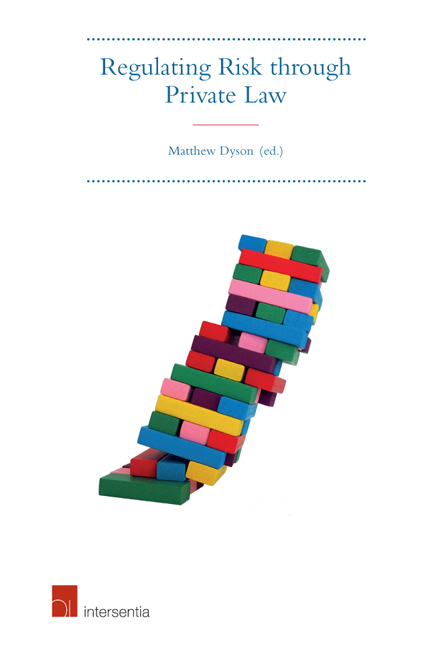Book contents
- Frontmatter
- Preface
- Contents
- Table of Cases
- List of Contributors
- Chapter 1 Introduction
- Part I Risk Overviews
- Part II State of the national art on risk
- Chapter 11 Legal Risk in International Commercial Disputes
- Chapter 12 Medical Accidents and Pharmaceutical Product Liability in France
- Chapter 13 Bearing and Sharing Risk in the Swedish Welfare State
- Chapter 14 Modernisation and Risk Regulation in the Italian Food Sector
- Chapter 15 Motor Vehicle Accidents Caused by Game Wandering onto Spanish Roads
- Chapter 16 Dutch Tort Law at the Crossroads: Judicial Regulation of Health and Environmental Risks
- Chapter 17 Sub Terra: Risk in the Chilean Mining Industry
- Chapter 18 Constitutionalising Rights and Reacting to Risk in South Africa
- Chapter 19 Regulating Risk in Brazil: Resort to General Clauses
- Chapter 20 What does Risk-Reasoning do in Tort Law?
- Chapter 21 Epilogue: What does Risk-Reasoning Tell Us about Tort Law?
- Index
- About the Editor
Chapter 11 - Legal Risk in International Commercial Disputes
from Part II - State of the national art on risk
Published online by Cambridge University Press: 13 October 2018
- Frontmatter
- Preface
- Contents
- Table of Cases
- List of Contributors
- Chapter 1 Introduction
- Part I Risk Overviews
- Part II State of the national art on risk
- Chapter 11 Legal Risk in International Commercial Disputes
- Chapter 12 Medical Accidents and Pharmaceutical Product Liability in France
- Chapter 13 Bearing and Sharing Risk in the Swedish Welfare State
- Chapter 14 Modernisation and Risk Regulation in the Italian Food Sector
- Chapter 15 Motor Vehicle Accidents Caused by Game Wandering onto Spanish Roads
- Chapter 16 Dutch Tort Law at the Crossroads: Judicial Regulation of Health and Environmental Risks
- Chapter 17 Sub Terra: Risk in the Chilean Mining Industry
- Chapter 18 Constitutionalising Rights and Reacting to Risk in South Africa
- Chapter 19 Regulating Risk in Brazil: Resort to General Clauses
- Chapter 20 What does Risk-Reasoning do in Tort Law?
- Chapter 21 Epilogue: What does Risk-Reasoning Tell Us about Tort Law?
- Index
- About the Editor
Summary
RISK AND ENGLISH PRIVATE INTERNATIONAL LAW
The language of commerce is the language of risk. To that extent, the legal regulation of business is the legal regulation of risk. The law relating to commercial transactions reflects, creates and controls the risks which the parties undertake. This is true of any branch of commercial law. But it finds particularly sharp expression in the rules of English law regulating cross-border transactions and in the way that commercial actors view those rules. More precisely still, it is reflected in the rules relating to cross-border litigation which regulate an area in which the cost of litigation and the numerous strategic choices faced by litigants bring considerations of risk to the fore. There are few areas of English law in which the English lawyer's distinctively commercial view of the law and its objectives are more clearly revealed.
In this world, dominated by complex, high-value, multi-jurisdictional disputes, the regulatory framework is provided by the rules of private international law. These concern principally the determination of jurisdiction, ascertaining the applicable law, and regulating the enforcement of foreign judgments. Significantly, however, these rules are not merely important in themselves but because they simultaneously create and regulate the risks associated with multistate litigation (defined as litigation involving such features as foreign counterparties, foreign laws, and foreign proceedings).
To understand the practice of litigators and the decisions of the courts, it is necessary to understand the role of private international law in the assessment of risk. And to judge the law's effectiveness we must ask whether it enhances or reduces the risk to the parties (and in particular whether it allows the parties to transactions to self-regulate the risk of transacting by contractual agreement).
This perspective must, however, be placed in context. It reflects the views of English lawyers and English courts, and the context in which private international law operates in England. English law's approach to the regulation of crossborder disputes responds to, and is explained by, the prominence of London as a centre for the resolution of international commercial disputes, and the role of the Commercial Court as an international forum. This in turn reflects the prominence of London as a financial centre, and the origin of so many disputes in the financial markets.
- Type
- Chapter
- Information
- Regulating Risk through Private Law , pp. 285 - 300Publisher: IntersentiaPrint publication year: 2018
- 1
- Cited by



